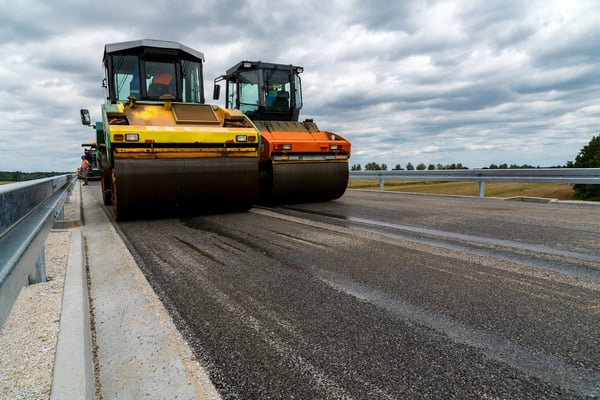Single, double, smooth, or Padfoot? If you’re deciding to hire a compaction roller for your next job, we have the perfect guide for you to make sure you're making the right choice.
What is a roller?
Road rollers are commonly used to compact or flatten gravel, soil, asphalt, concrete or other surface material. The initial use of rollers is to apply direct pressure to crush, rub or vibrate loose materials into the ground. The process of rolling is used to compress coarsely bound footing materials, so they do not come loose and remain compact. Construction such as roadworks and creating compressed foundations are the most common forms of projects that require the use of a roller. Rollers can also be used in areas as diverse as landfill sites and agriculture projects.
With there being a wide range of roller types it is important to determine which machine your project requires, the size of the project and types of soil involved.
Single roller or double roller
A single drum roller is the most common roller being a traditional style cylinder roller with a large steel drum in front and two wheels at the back. As it is smaller than a double roller the single roller is heavier in the front meaning this extra weight can’t roll over some ground surfaces. Single drum rollers are perfect if you are looking for levelling and paving the ground for driveways, sidewalks, and highways and creating bases for buildings.
A double drum roller consists of two steel cylinder rollers with one being at the front and one at the back. This means the roller is able to move forward and backwards due to its lack of tires creating less traction. Due to having less traction than a single drum you won’t use this roller for specialised work. However, the power and efficiency of the drum rollers are great for preparing and refining surfaces and is your go-to for heavy-duty asphalt applications.

Smooth roller or padfoot roller
Smooth rollers can apply static pressure, vibration and impact on ground materials. Using a smooth roller during projects involving granular materials will give a stronger grip to the surface to lock the pieces of material together.
A padfoot or tampering roller involves a hexagonal pattern of rectangular boot-shaped knobs that cover the surface of the roller. It functions the same as a smooth roller however creates manipulative force and is great to use with soil that contains cohesive materials. These rollers operate at a higher speed and achieve a higher degree of compaction, as it is more uniform and capable of breaking up larger pieces.
Find the right roller for hire
Purpose of each roller
The range of compaction equipment below outlines each of type of roller's special purpose:
Double drum smooth roller:
Double drum smooth rollers are used on extensive or medium-sized projects ranging from footpaths, road works, industrial yards, parking areas, smoothing of loose stones and road bedding containing asphalt or limestone rock.
Double drum padfoot roller:
Double drum padfoot rollers are best used for compacting difficult-to-compress and semi-cohesive soils so are ideal for subbases of foundations, roads and utility excavations.
Single drum smooth roller:
Single drum smooth rollers predominantly work on smaller projects such as levelling the ground of driveways or footpaths and projects with more granular materials.
Single padfoot drum roller:
Single padfoot drum rollers are designed for industrial areas, haul roads, airfields, highways and dams. A padfoot roller also has more mobility to fill trenches in confined spaces.
Hire a Roller with iseekplant today
When you’re looking to hire a roller it all comes down to picking the right one for your task, so if you are still unsure which roller is the best for your job a quick chat with a plant hire company or the iseekplant team on 1300 691 912.
Here at iseekplant, we have a nationwide network of compaction roller suppliers ranging from Brisbane, Sydney and Melbourne to Canberra, Adelaide, Darwin, and Perth, so get in touch with us today to get started on your next project!
Subscribe to the Constructionsht Blog below to stay up to date with the latest construction industry news and projects across Australia!


